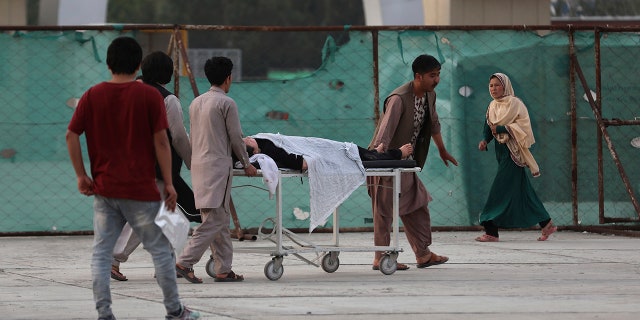Fox News Flash top headlines for May 8
Fox News Flash top headlines are here. Check out what’s clicking on Foxnews.com.
KABUL, Afghanistan — The death toll in a horrific bombing at a girls’ school in the Afghan capital has soared to 50, many of them pupils between 11 and 15 years old, the Interior Ministry said Sunday.
The number of wounded in Saturday’s attack has also climbed to more than 100, said Interior Ministry spokesman Tariq Arian.
Three explosions outside the school entrance struck as students were leaving for the day, he said. The blasts occurred in a mostly Shiite neighborhood in the west of the capital. The Taliban denied responsibility, condemning the attack.
The first explosion came from a vehicle packed with explosives, followed by two others, said Arian, adding that the casualty figures could still rise.
MCCONNELL PREDICTS TALIBAN COULD BE RUNNING AFGHANISTAN BY END OF YEAR
In the capital rattled by relentless bombings, Saturday’s attack was among the worst. Criticism has mounted over lack of security and growing fears of even more violence as the U.S. and NATO complete their final military withdrawal from Afghanistan.

Afghan men try to identify the dead bodies at a hospital after a bomb explosion near a school west of Kabul, Afghanistan, Saturday, May 8, 2021. (Associated Press)
The attack targeted Afghanistan’s ethnic Hazaras who dominate the western Dasht-e-Barchi neighborhood, where the bombings occurred. Most Hazaras are Shiite Muslims
The area has been hit by violence against minority Shiites and most often claimed by the Islamic State affiliate operating in the country. No one has yet claimed Saturday’s bombings.
The radical Sunni Muslim group has declared war on Afghanistan’s Shiites. Washington blamed IS for a vicious attack last year in a maternity hospital in the same area that killed pregnant women and newborn babies.
Soon after the bombing, angry crowds attacked ambulances and even beat health workers as they tried to evacuate the wounded, Health Ministry spokesman Ghulam Dastigar Nazari said. He had implored residents to cooperate and allow ambulances free access to the site.

An injured school student is transported to a hospital after a bomb explosion near a school in west of Kabul, Afghanistan, Saturday, May 8, 2021. (Associated Press)
Bloodied backpacks and schools books lay strewn outside the Syed Al-Shahda school. In the morning, boys attend classes in the sprawling school compound and in the afternoon, it’s girls’ turn.
US PULLOUT FROM AFGHANISTAN COULD LEAVE 17,000 INTERPRETERS’ LIVES IN DANGER
Residents in the area said the explosion was deafening. Naser Rahimi told The Associated Press he heard three separate explosions, and immediately thought that the sheer power of the blasts meant the death toll would almost certainly climb.
One of the students fleeing the school recalled the attack, the girls’ screams of the girls, the blood.
“I was with my classmate, we were leaving the school, when suddenly an explosion happened, ” said 15-year-old Zahra, whose arm had been broken by a piece of shrapnel.
“Ten minutes later there was another explosion and just a couple of minutes later another explosion,” she said. “Everyone was yelling and there was blood everywhere, and I couldn’t see anything clearly.” Her friend died.
Outside the Muhammad Ali Jinnah Hospital, in the Dasht-e-Barchi neighborhood dozens of people lined up to donate blood, while family members checked casualty posted lists on the walls.
Most of the dozens of injured brought to the EMERGENCY Hospital for war wounded in the Afghan capital, “almost all girls and young women between 12 and 20 years old,” said Marco Puntin, the hospital’s programme coordinator in Afghanistan.
In a statement following the attack, the EMERGENCY Hospital said the first three months of this year has seen a 21 per cent increase in war-wounded.
IS has previously claimed attacks against minority Shiites in the same area, last year claiming two brutal attacks on education facilities that killed 50 people, most of them students.
Even as the IS has been degraded in Afghanistan, according to government and US officials, it has stepped-up its attacks particularly against Shiite Muslims and women workers.
CLICK HERE TO GET THE FOX NEWS APP
Earlier the group took responsibility for the targeted killing of three women media personnel in eastern Afghanistan.
The attack comes days after the remaining 2,500 to 3,500 American troops officially began leaving the country. They will be out by Sept. 11 at the latest. The pullout comes amid a resurgent Taliban, who control or hold sway over half of Afghanistan.
The top U.S. military officer said Sunday that Afghan government forces face an uncertain future and possibly some “bad possible outcomes” against Taliban insurgents as the withdrawal accelerates in the coming weeks.
Associated Press photographer Rahmat Gul and video journalist Ahmad Seir in Kabul, Afghanistan and Kathy Gannon in Islamabad, Pakistan contributed to this report.



Comments